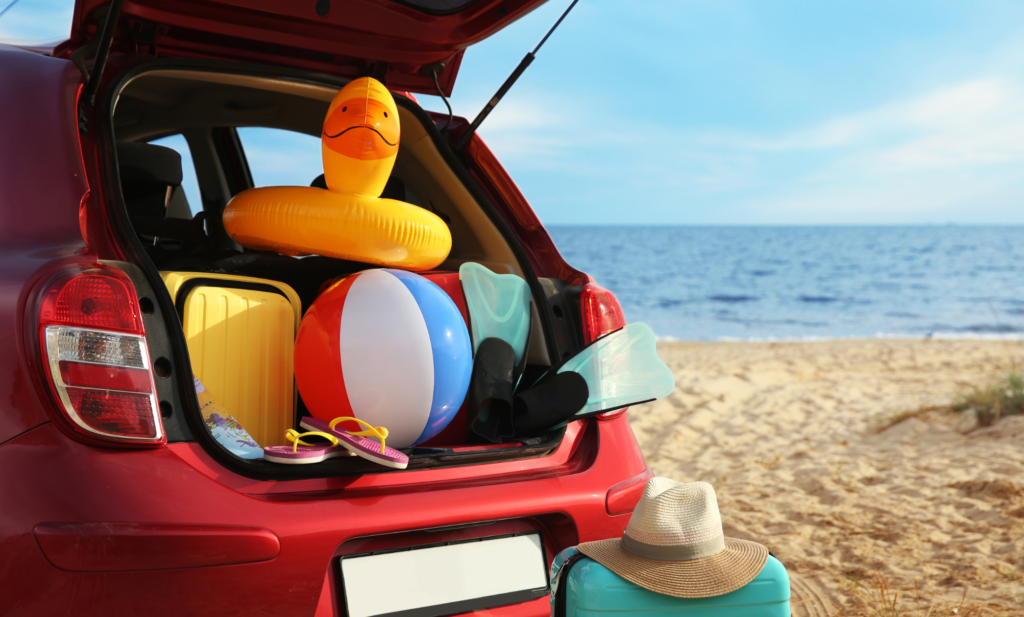The Summer Traveler’s Guide to Car Accidents, Emergency Kits, and Collision Repair

A car accident is never convenient, but it’s even more stressful when it happens while you’re on vacation. Whether you’re driving cross-country or taking a weekend road trip, being prepared for the unexpected can make a major difference. Knowing how to handle a car accident away from home—and what to keep in your car for emergencies—can help you stay calm and protected. In this guide, we’ll walk you through what to do immediately after a collision, how to get the help you need, and what essentials belong in your summer car emergency kit. With more people traveling during the summer months, it’s critical to stay informed and ready for anything.
What to Keep in Your Car for Summer Road Trips in Case of Car Trouble or an Accident
A well-stocked summer car emergency kit is your best friend on the road. Whether it’s a blown tire or a car accident on vacation, being prepared makes a huge difference. Here’s what your road trip accident kit should include:
- First-aid kit with antiseptics, bandages, and burn cream
- Flashlight and extra batteries or a hand-crank version
- Reflective triangles, flares, or LED beacons
- Tool kit with screwdrivers, pliers, wrenches, and tire pressure gauge
- Portable jump starter with USB ports
- Water bottles (at least one gallon) and energy snacks
- Phone charger with solar backup or external power bank
- Printed documents: registration, insurance, roadside assistance numbers
- Accident checklist, pen, and notebook for details and sketches
- Sunscreen, hat, and sunglasses for roadside waits
- Emergency blanket or foil wrap
- Zip ties, duct tape, and rubber gloves
- Small fire extinguisher
- Spare cash in small bills in case digital payment fails
Why Car Accidents Spike in Summer
During summer, roads are full of vacationers, teen drivers, and people unfamiliar with local routes. Higher traffic volumes combined with heat-related mechanical issues lead to more breakdowns and collisions. Road construction zones, glare from the sun, and late-night driving also contribute to increased risk. Stay vigilant, take regular breaks, and never drive fatigued.
What to Do Immediately After a Car Accident on Vacation
If the worst happens, it’s important to be prepared. First things first: ensure everyone’s safety. If you’re physically able, move your vehicle to a safe location—preferably out of traffic. Turn on your hazard lights to alert other drivers. Check yourself, your passengers, and anyone in the other vehicle for injuries. Call 911 immediately, even if the accident seems minor. In many states, a police report is required for insurance claims.
If you’re in a rural area, know that emergency services may take longer to arrive. Stay in your vehicle if you’re on a busy road, unless it’s unsafe. Once help arrives, be respectful and cooperative with law enforcement. Provide clear, honest answers without speculating or admitting fault. Ask how to obtain a copy of the accident report—it will be essential later.
Handling Medical Concerns in an Unfamiliar Place
If anyone is injured, prioritize getting medical care. Even if symptoms seem minor, visit an urgent care center or emergency room. Some injuries, like whiplash or internal trauma, may not show symptoms immediately. Save all medical records, prescriptions, and receipts. If you’re far from home, ask if the facility can forward records to your primary care provider.
Your health insurance provider may offer a nurse hotline or mobile app to help find in-network services, even when you’re out of state.
Report the Car Accident to Your Insurance and Rental Company
As soon as the situation is stable, notify your car insurance company. Many insurers offer mobile apps that allow you to upload photos and file a claim directly. If you’re in a rental car, inform the rental agency immediately. Most require documentation within 24 hours.
Take detailed photos of the accident scene, including vehicle positions, license plates, road signs, and any visible injuries. Exchange names, contact info, insurance details, and driver’s license numbers with all involved parties. Ask any witnesses for their contact information.
Minor Fender Bender or Major Collision? What to Know
If the damage is minor and the car is driveable, you may decide to continue your trip. But beware—underlying issues like a bent frame or alignment problems may not be visible. Have the car inspected by a local mechanic before hitting the road again. If the damage is more severe, towing it to a local collision repair center is the safer choice.
Some travelers make the mistake of driving home in a damaged vehicle, risking further mechanical failure or legal issues. When in doubt, tow it out.
Finding Collision Repair Help While Traveling
Not all repair shops are created equal. Ask your insurance for a list of preferred providers, but don’t feel obligated to choose from it. Look for I-CAR Gold Class shops or ASE-certified technicians. Read online reviews and call ahead to ask about experience handling out-of-state claims.
Shops that specialize in collision repair travel often offer virtual consultations, text updates, and coordination with your local shop if you plan to complete repairs after returning home. Keep all documentation and ask for digital copies of estimates and parts orders.
Should You Drive Your Damaged Car or Have It Towed?
Even if the vehicle seems to be running, unseen damage could make it unsafe. Leaking fluids, loose bumpers, or compromised airbags pose risks. If any warning lights are on, the car pulls to one side, or strange noises occur while driving, tow the vehicle. Many insurance plans and roadside assistance memberships cover towing up to a certain distance.
Travel Insurance and Emergency Support
Before your trip, check whether your travel insurance—or even your credit card—includes emergency roadside assistance, trip interruption coverage, or rental car protection. These benefits can offset costs if your vacation is cut short or your car becomes undriveable.
Knowing what’s covered ahead of time allows you to act confidently and avoid unexpected expenses.
What to Do When You Return Home
Once home, follow up with your insurance company to ensure all paperwork is submitted. Schedule a final inspection of your vehicle if repairs were done out of state, and confirm that warranties are honored nationwide. If your vehicle was shipped home, thoroughly inspect it upon arrival and test drive before resuming normal use.
Share the Knowledge and Stay Safe
A car accident during vacation can turn a dream trip into a nightmare—but with the right preparation, you can manage the situation with confidence. Having a robust summer car emergency kit and knowing how to respond to a car accident on vacation helps ensure your safety, protects your passengers, and speeds up recovery. Share this guide with fellow travelers so they can be road-ready too.
Need Collision Repair You Can Trust?
If you’ve been in a car accident—whether close to home or while traveling—Purnell Body Shop is here to help. Our expert technicians handle everything from minor dents to major collision repairs, and we’ll work directly with your insurance to make the process as smooth as possible.
Contact us today to schedule an estimate or get guidance on your next steps. Let Purnell Body Shop get you back on the road with confidence.


